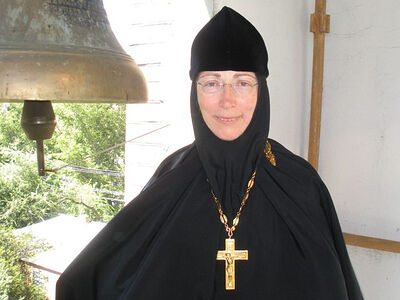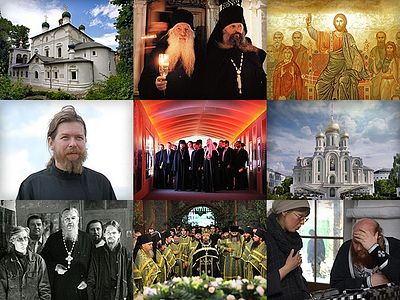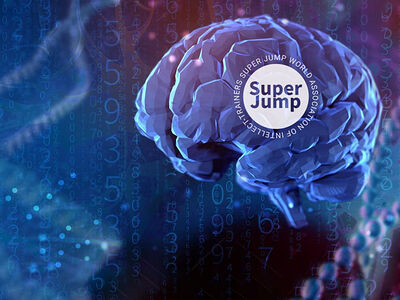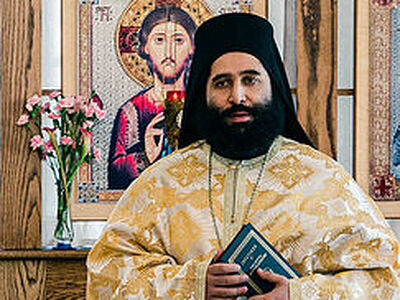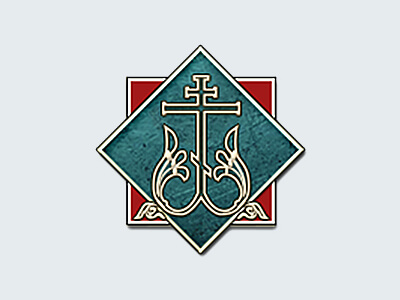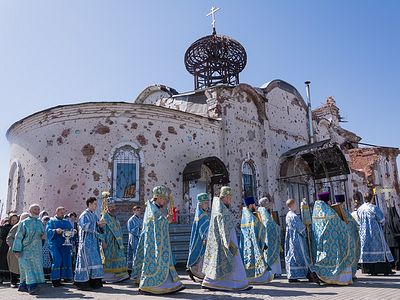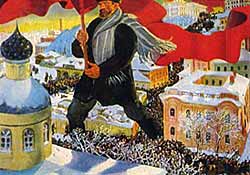 аНКЭЬЕБХЙ (йСЯРНДХЕБ а.л.) аНКЭЬЕБХЙ (йСЯРНДХЕБ а.л.) |
| Bolshevik (Kustodiev B. M.) |
The topic “Lenin and Religion” has got various treatments, but each time its analysis was too narrow. Partially because of activities of Lenin himself, who called for fighting with religion as an ideology of the ruling classes that fuddled and enslaved common people; he believed it was necessary to change social conditions, publish antireligious literature and conduct antireligious propaganda. But real Lenin’s attitude to religion was not fully revealed in his criticism of religious ideology. Lenin’s fanatic atheism, his fierce struggle with religion cannot be brought down to struggle with social harm caused (according to Marxism) by erroneous, but historically conditioned form of ideology – religion. We should put it clearly: Lenin fought not against religion, but against God, whose existence he fiercely denied.
To touch the secret of Lenin’s attitude to religion it is necessary to remember a writer of genius Dostoevsky, who managed to reveal the teomachist intention in the European culture. As an artist Dostoevsky did not formulate his ideas in completed concepts, but in the “philosophy of images” he is extremely accurate. Dostoevsky fought against materialistic views of his opponents, though not regarding them proper materialists. Consciousness of atheists – the characters of his novels – is dual: they need God to deny Him.
This is exactly what we notice in Lenin’s behavior. He could not mention religion without damnation, for he was possessed by the need of pathological reviling of the Divine: religion for him is nothing but “sacerdotalism”, “coquetting with God”, “the foulest of things”, “necrophilia”, for “every religious idea about a certain god, every coquetting with god is inexpressible abomination… the most dangerous abomination, the foulest pest”. In his approach to different historical phenomena Lenin made a show of finding relativity in everything and fighting with any idea of something being absolute. This was the core of his struggle with spirituality. But as soon as it came to religion, Lenin retreated even from “impartial” Marxist methodology and fell into frenzy and madness. It is evident that at the bottom of it there was his perception of the religious reality as the absolute enemy. Here Lenin lacked patience even for presenting religion as something historically conditioned and temporal.
In his work “Childhood disease of leftism in Communism” Lenin taught that one should compromise in every issue, but not in the goals of Communism. He always jeered at those who were unable of this. But Lenin himself never allowed compromise with religion. It never occurred to him to dodge God, the Church or religion. Stalin being a true Leninist in all other things still allowed employment of religion to retain power on the first communist base. Marx, who would not miss to say a meanness about religion, still made attempts to use historical approach. Lenin fell even below the level of Marxism and was ecstatic about the most vulgar antireligious brochures and critics of religion like the malicious Helvetius.
Lenin feared not only religious reality, but also of religious symbols. He could not stand even mentioning God. For example, he was irreconcilable with “God-seeking” and “God-construction”, though in these doctrins the concepts about real God were missing, and he could derive revolutionary benefit from them in atheistic propaganda. The fact that Lenin could not play or joke with religion and treated everything pertaining to it most seriously, testifies that in Lenin’s opinion destroying religion was the most important purpose of the communist regime. Lenin launched the bloodiest and most massive religion persecution in history.
As early as on May 1, 1919, in a document addressed to Dzerzhinsky Lenin demanded: “It is necessary to do away with the cassocks and religion as soon as possible. The cassocks should be arrested as counter-revolutionaries and saboteurs and shot away hip and thigh in all places. As many as possible. Churches should be closed down. Their buildings should be sealed up and turned into storehouses.” On December 25, 1919, on account of the feast of St. Nicholas the Wonderworker, when the Orthodox could not work Lenin issued an order: “It is silly to put up with “Nicholas”. We should rouse everyone in Cheka to shoot away those missing at work because of “Nicholas”. In his letter to Molotov for the members of Politburo of March 19, 1922, Lenin insisted on the necessity to make use of mass famine in the country and appealed to the communist leaders to archly blitz the Church within the framework of the campaign “seizure of valuables”, to deal religion a deadly blow in order to deprive the future generations of believers of any will to resist: “Just now and only now, when in the countryside they eat people and there are hundreds or even thousands corpses lying on the roads we can (and so we must) conduct seizure of church valuables with most frenzied and merciless energy, never minding suppression of any kind of resistance… At all costs we have to bring about seizure of church valuables in the most determined and fastest way, which will provide us with funds of several hundred millions gold rubles.” Lenin agreed, “if it is necessary to go the length of some cruelties to achieve a certain political goal, it should be carried out most drastically and quickly, for the mass cannot stand long-lasting cruelties”. Lenin called for “fighting the most determined and merciless battle to the Black-Hundred clergy and suppress their resistance with the cruelty, which they will not forget for many decades”. Lenin persuades his associates that “the campaign of seizure of Church valuables” should be conducted “with merciless determination, not stopping short of anything and as soon as possible. The more representatives of reactionary bourgeoisie and clergy will be shot away under this pretext, the better. We should give the public such a lesson that they will not dare think of any resistance for quite a few decades.”
The reason for such a cannibalistic pathos is that Lenin hated the Church even more than religious ideology, because the Church is life in God. Personal satanic malice is felt in Lenin’s attitude to the Church, infernal hate, which he was unable to hold back. As soon as he got the chance to destroy the Church, Lenin forgot all his theories about strict laws of history, asserting which he as Marksist set himself against the narodnik movement. In his practical attitude to religion Lenin lapses into voluntarism. It is not a fruit of hypocrisy, but rather the result of doublethink, which reflects the dual nature of Marxism-Leninism. Lenin always declared himself complete materialist and atheist, but was he really such?
No doubt, the Leninism ideology is materialistic: primacy of matter, concept of the world as a mechanism, and of the man as of a social-biological machine – a part of the world’s self-developing machine. But according to its objectives and deep orientedness Leninism could not be materialism. The logic of complete materialism does not offer any standards of conduct, has no ideas about proper and improper, for man being a socially biological mechanism cannot have any obligations before the world machine. Such materialism should regard the idea of God as a harmful mistake, but it cannot cause the pathos of maniacal denial or unrestrained passion for reviling. It is only the duty of theomachy that makes Lenin behave toward the world as if its basis is non-material. Denying existence of God Lenin fought against God and the Divine as against the most real essence. Fanatic atheism of Lenin’s type is possible only when they deny religion as a harmful superstition, but they fight against God as an absolutely hostile reality.
At the same time it is absolutely logical that exactly materialism is the ideology of Leninism. Leninism is not materialistic according to its motives and goals, but only materialism may be the ideology of Leninism. Thought materialism with its logics cannot substantiate militancy of atheism, and all the more the pathos of theomachy, it is necessary as an instrument and the ultimate aim of theomachy. Such position cannot be consistent, for it is based on self-deception, playing with oneself, which allows to avoid direct denying of principles, and it is logically inevitable within the materialistic ideology. Leninism is unable of critical introspection, because it is philosophical and psychological doublethink described by George Orwell. The foundation of any kind of doublethink is doublethink toward God.
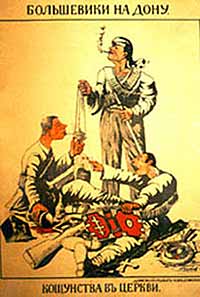 аНКЭЬЕБХЙХ МЮ дНМС. йНЫСМЯРБЮ Б ЖЕПЙБХ. оКЮЙЮР аЕКНЦН ДБХФЕМХЪ. 1918 Ц. аНКЭЬЕБХЙХ МЮ дНМС. йНЫСМЯРБЮ Б ЖЕПЙБХ. оКЮЙЮР аЕКНЦН ДБХФЕМХЪ. 1918 Ц. |
| Bolsheviks in Don region. Blashphemy in church. Poster by White movement. 1918 |
It is wrong to regard atheistic materialism as the ultimate antithesis of religion. It is impossible to consider devil – the personified non-existence – a materialist. Only such an atheism can be the ultimate antithesis of religion that at the same time acts as an anti-Christian “religiosity” having its own scriptures and cult, its own idols. Leninism is an anti-Christian doctrine that thrusts its way of existence. A typical Leninist-atheist is not a dispassionate armchair scientist, but an obsessed fanatic, burning with hatred to the Divine foundations of the world. Leninism with its will for global rearrangement of the universe recognizes that the world is not deterministic; in the world both religion and atheism have chances to win. The world is not material, but in case Communism wins it may become materialistic. God for Lenin is not something, which either exists or not, but something that can exist but should not, something that should be eliminated. Victory over God is brought about through man. That is why the orientation of Marxism-Leninism is revealed through the concept of what man is and what he should become.
While man in Christianity is a participant of world’s deification and attainment of Divine existence, the concealed goal of Lenin’s atheism is to turn man into an agent of excarnation, into the source of non-existence. However this is not merely the will “not to be”, but a desire to fall into state opposite to the existence created by God, and to lug away the whole world. For man to be God’s co-creater, he has to possess freedom and ability to create, because only through creation in God it is possible to deify the world. To be a carrier of non-existence man has to refuse freedom and ability to create and to determine himself to the external circumstances. Contrary to the desire of a Christian to live in God as the source of freedom (“where the Spirit of the Lord is, there is liberty”) a Marxist-Leninist tries to live in the impersonal necessity releasing from responsibility for apostasy.
The concept of Marxist-Leninist ideology is revealed in its attitude to history, to formulation of human role in it. Lenin regarded man as a derivative of production relations. It means that all people of a certain epoch had common essence irrespective of individual diversity, that man is rigidly determined by the ambience. But the party stands over this ambience, it controls it (“there is nothing impossible for the Party”), so it controls also man. The ultimate obsession with theomachy makes free of all materialistic and atheistic “laws” and confers satanic freedom in non-existence. Thus, atheistic materialism claims that society is determined by the laws of material history, which in fact allows the party leaders to have freedom to direct these “laws” on behalf of the theomachist atheism. This logic was exposed already by Dostoevsky, who in his analysis of phenomenon of Nechaev’s movement anticipated in the figure of Shigalev the future incorporation of Communism. Shigalev “offered for the ultimate solution of this issue to divide the mankind into two unequal parts. One tenth is given personal liberty and unlimited rights over the rest nine tenths. The latter have to lose there identity and turn into a sort of herd and under unlimited obedience through a number of metamorphoses reach primeval innocence, a kind of the primeval paradise, however they will have to work. The measures suggested by the author to strip nine tenth of their will and altering them into a herd by means of reeducation of whole generations are quite remarkable, based on natural data and are very logical”. And Russia has firsthand knowledge of this iron logic of all kinds of apostasy.
Dostoyevsky was an active opponent of materialistic theories that claimed that man is “spoilt by ambience”, but he did not consider his revolutionary characters to be materialists. It is not by chance that he called his novel “Demons”. Demonic theomachy parasitizes on materialism devoid of any ethics. It cannot act openly, because through theomachy itself it will recognize the One, against Whom it is fighting – God.
Thus, Leninism is a dialectical combination of the ultimate atheism with a special kind of religious pathos. This is obsession with Satanism as with total theomachy. Leninism is materialistic by its ideology, but not by ontology. Materialism and atheism is an instrument for fighting against something that can exist only beyond the framework of this ideology. The aim and the basic idea of Leninism is construction of extremely anti-Christian society, and the concealed ultimate aim is non-existence. Theomachy is the core and dominant of Leninism. But theomachy demands destruction of the universe as God’s creation and destruction of God’s image and likeness in man. This is the reason for destructions and genocide under the regime of Marxism-Leninism unprecedented in the history of humankind. Thus all the parts of Marxism-Leninism doctrine are subject to its primary target – achievement of infernal kingdom on earth, they describe different stages on the way to it and the methodology of struggle for it.

